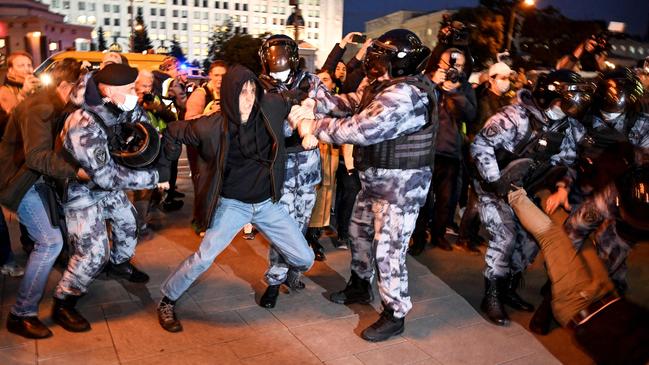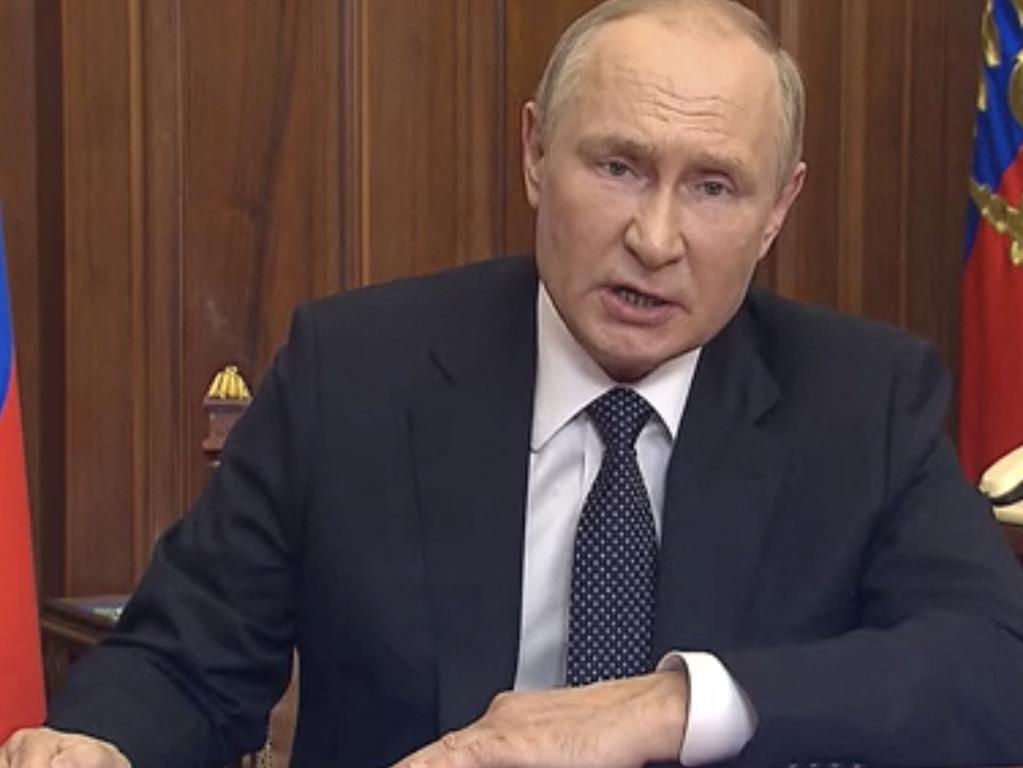Arrests as Russians rise up in protest and try to flee country
More than 1300 people were arrested in 38 towns and cities in the biggest opposition show of dissent since Russia’s invasion of Ukraine.

Russian police cracked down on anti-war protests nationwide and men of fighting age scrambled to secure flights out of the country after President Vladimir Putin said that military reserves would be deployed to Ukraine.
“No war!” protesters chanted in central Moscow as riot police on Wednesday night moved in to make arrests on Old Arbat, a street close to a defence ministry building. Women shouted: “We want our children to live!”
Masked officers wrestled teenagers to the ground. A middle-aged man lashed out at officers as they tried to arrest him. “Send Putin to the trenches!” another protester screamed.
“I have two children who could both be conscripted,” a tearful woman told Sota, an online media outlet. “I brought them both up myself. I don’t want to be left alone without my kids when I’m old. And for what? So that they can go and kill people?”
Protests took place in 38 towns and cities, including in St Petersburg, where Mr Putin was born, and Novosibirsk, the largest city in Siberia. Although relatively modest, they were the biggest show of dissent since the Kremlin moved to arrest prominent opposition leaders and close down all independent media in the wake of Russia’s invasion of Ukraine. State-run media ignored the protests.
“I don’t want our guys to be sent there (to Ukraine). What’s wrong with that?” one young woman said as she was led away by police in Perm, a city near the Ural mountains. More than 1300 people were arrested across the country, the rights group OVD-Info said.
The protests were called by Vesna, an anti-war movement. “The war is no longer ‘somewhere over there’. It has come to our country, to our homes, for our loved ones,” it said.
The protests came after Mr Putin had announced a “partial mobilisation” of Russia’s military reserves. Defence Minister Sergei Shoigu said 300,000 people with military experience would be called up. The Kremlin later appeared to admit, however, that those numbers could rise. Critics also said that Mr Putin’s decree on mobilisation was so vague that almost anyone could be drafted. Moscow refused to say if it was planning to forbid men of fighting age from leaving the country. In a bellicose speech broadcast live across state media on Wednesday, Mr Putin declared that Russia was involved in a fight for its very existence. He said Ukraine was being backed by NATO’s “entire military machine” and accused Western countries of seeking to “weaken, divide and ultimately destroy our country”.
He said his nation was morally bound to defend Russian speakers in eastern Ukraine’s Donbas region against the “Nazi regime” in Kyiv. In an apparent attempt to draw on the memory of the Soviet Union’s war against Nazi Germany, Mr Putin said that it was Russia’s “destiny” to defeat enemies seeking to “split up and enslave our motherland”.
His comments came as the Kremlin prepared to annex swathes of occupied Ukraine. Moscow-installed officials in the Donetsk, Kherson, Luhansk and Zaporizhzhya regions have said they will stage referendums in the coming days on joining Russia. “We cannot but respond to their sincere striving to decide their destiny on their own,” Mr Putin claimed.
State television said on Wednesday that the regions would be incorporated into Russia in the near future, even before a single vote had been cast.
Flights to Armenia, Georgia and Turkey, which do not require visas from Russians, sold out almost as soon as Mr Putin finished his speech. Tickets to Dubai rose to more than 300,000 roubles ($7325), about five times the average monthly wage. “How to leave Russia” was the top item on Google’s Russian-language search engine. Latvia and Lithuania, which both border Russia, said security concerns meant that they would not allow Russians seeking to avoid conscription to enter the country.
Medics in Moscow have begun receiving orders to report to recruitment centres, Pavel Chikov, head of the Agora human rights group, said. Teachers and bank workers were also reportedly being told to report for military duty, with Agora receiving 6000 calls in 24 hours from Russians seeking to avoid being sent to Ukraine. As the Kremlin sought to rally the country around the flag, MPs voted to make it a criminal offence, punishable by up to three years in prison, to “disrespect” the St George’s ribbon, a popular pro-war symbol.
Opinion polls indicate that 55 to 75 per cent of Russians support what the Kremlin calls its “special military operation” in Ukraine. Opposition activists argue, however, that people are afraid to openly condemn the war.
Critics say that while the elite is happy for ordinary Russians to die in Ukraine, they will keep their own male relatives out of it. Dmitri Nizovtsev, an opposition activist, posed on Wednesday as a military recruitment official and called the sons of prominent pro-Kremlin figures. None of them expressed any desire to fight in Ukraine.
Nikolai Peskov, the 32-year-old son of Dmitry Peskov, the Kremlin spokesman, appeared to suggest that he would use his father’s influence to avoid the draft. “I’ll resolve this at a (higher) level,” he said.
The Times





To join the conversation, please log in. Don't have an account? Register
Join the conversation, you are commenting as Logout